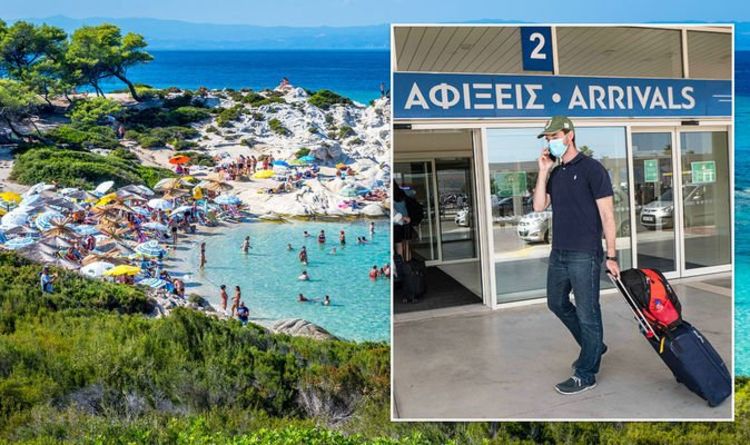Greece holidays: What are the latest rules as some lockdown measures ease?
Travel: Simon Calder discusses taking PCR tests
We use your sign-up to provide content in ways you’ve consented to and to improve our understanding of you. This may include adverts from us and 3rd parties based on our understanding. You can unsubscribe at any time. More info
Greece has become a popular destination for British holidaymakers now that fully vaccinated travellers can visit the amber list country without the need for quarantine on their return home. However, a series of restrictions across some of its islands has meant stricter rules for visitors.
The good news is many of these restrictions have once again been eased following a drop in Covid cases.
On Wednesday, the Foreign, Commonwealth and Development Office (FCDO) issued a new update announcing that “partial lockdowns” in Crete and Zakynthos have been lifted.
The “partial lockdowns” included a nighttime curfew between 1am and 6am in Crete’s towns of Heraklion and Chania, and on the island of Zakynthos.
There was also a ban on music in entertainment venues in these regions.
Moving forward these restrictions will no longer be in place, however, there are still some Covid measures that Britons visiting Greece should be aware of.

What rules and restrictions are in place in Greece?
Covid rules and restrictions in Greece “remain under regular review” therefore the FCDO advises travellers to keep checking the most up-to-date information for the locality they are visiting.
Some of the most important rules in place include:
Face masks must be worn in indoor public and communal spaces, including workplaces and on public transport.
There are restricted numbers for those hoping to visit churches or religious services.
Passenger numbers are restricted on public transport. In particular, taxis are only able to service a maximum of three people in a vehicle with up to seven seats. If a vehicle has up to nine seats, a taxi can carry four people. This rule does not apply to families.
Cross-regional travel outside of mainland Greece, or the islands of Lefkada, Evia and Salamina, can only be done if travellers have proof of vaccination, a negative COVID-19 test or proof of having recovered from coronavirus.
DON’T MISS
Book this Hobbit House in the Forest of Dean [INSIDER]
What is an EU Digital Covid Certificate? [INSIGHT]
‘Absolutely stunning’ Travel expert’s UK staycation hidden gem [COMMENT]
What consequences are there for breaching Covid restrictions in Greece?
Consequences for breaching coronavirus restrictions when in Greece can vary depending on the severity of the breach and the region you are in.
When “partial lockdown” rules were in place, both locals and tourists could be slapped with fines between €50,000 (approximately £42,329) to €200,000 (approximately £169,310), according to the Greek Civil Protection.
Those who do not follow directions to self-isolate or quarantine when required could face €5,000 (£4,254) fines.

What entry rules are in place for Britons visiting Greece?
UK arrivals are permitted to enter Greece and its islands but must follow strict entry requirements.
Britons must complete a Passenger Locator Form (PLF) before travelling to Greece, regardless of their method of transport.
They must also provide either proof of a negative COVID-19 PCR test taken within 72 hours before arriving in Greece or proof of a negative rapid antigen test taken within the 48 hour period before arriving in Greece.
Alternatively, fully vaccinated passengers can show evidence of their inoculation status.
They must have received both doses of the jab 14 days or more before travel.
Greece will also accept proof of recovery from COVID-19 for entry purposes.
Evidence of a positive COVID-19 PCR test result taken between 30 to 180 days of your travel dates can be used and can be demonstrated via the NHS COVID Pass.
Source: Read Full Article


